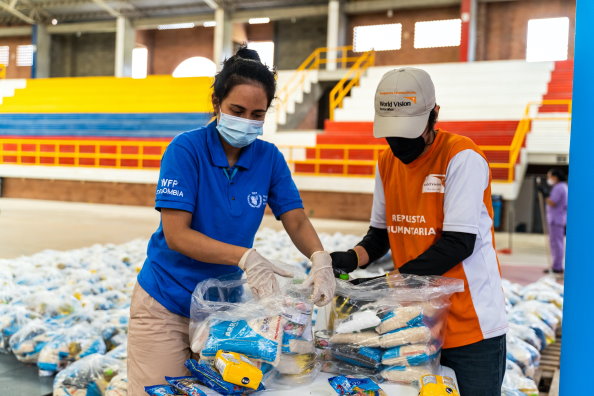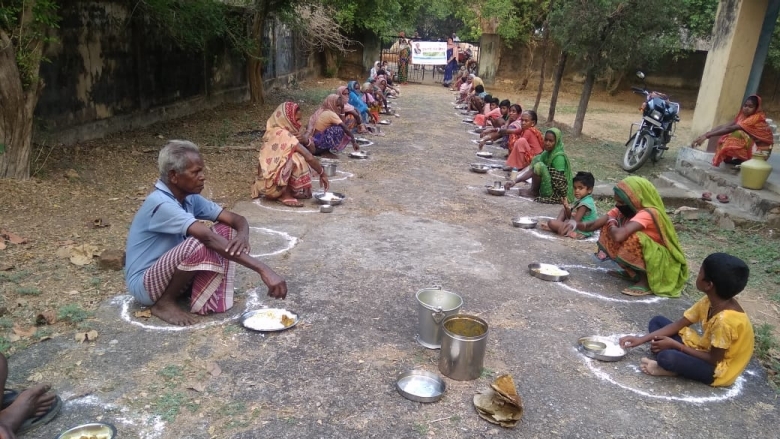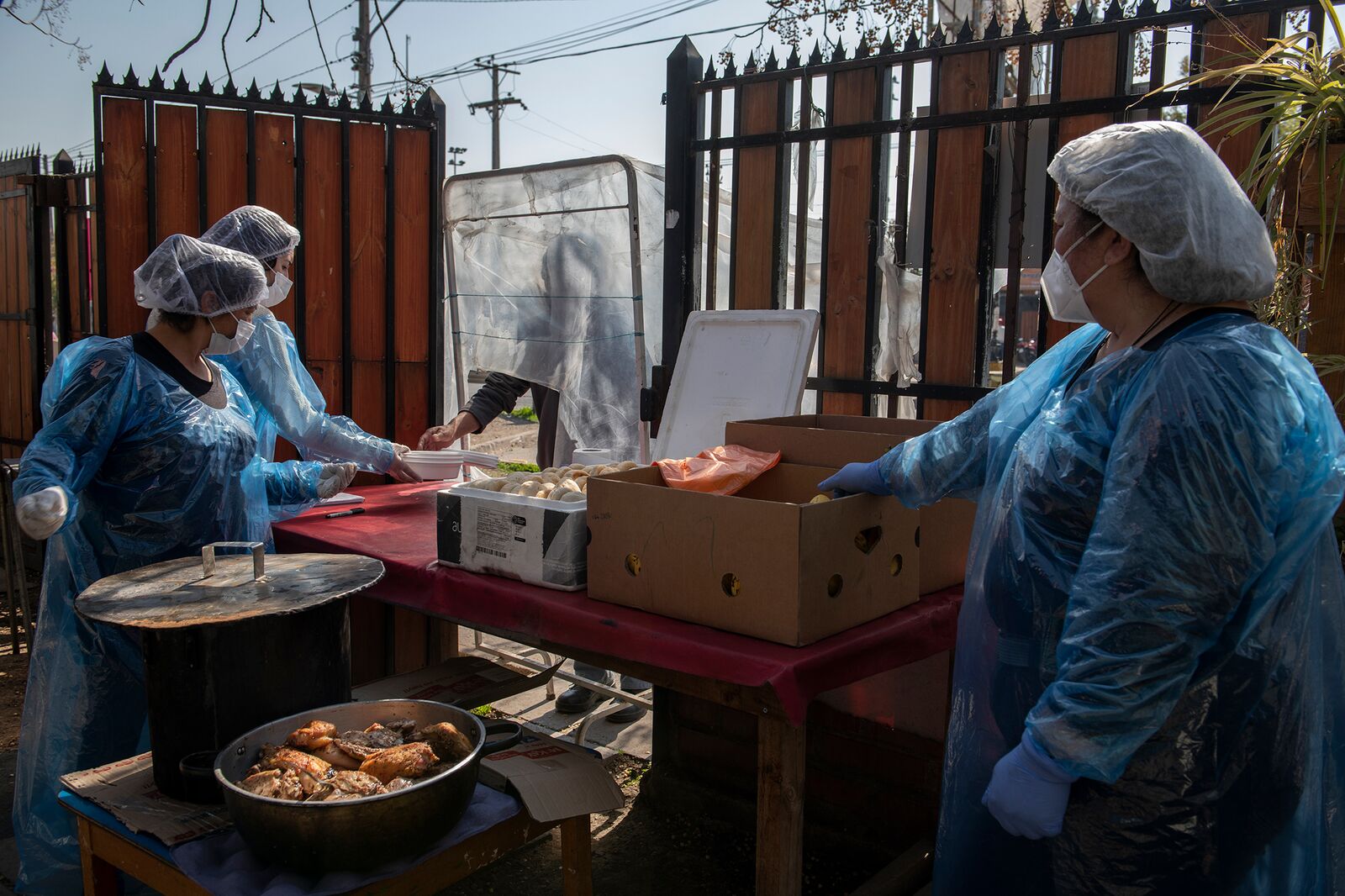Growing Pandemic-Caused Food Insecurity
 |
| Photo: WFP/Mathias Roed |
"We used to eat meat. Now, there's no meat. We used to eat chicken. Now, there's no chicken.""We used to drink milk. Now there's no milk. [There's not even bread].""[Planting corn and beans on a small loaned plot of land, borrowing seeds and fertilizer to feed his four children] It's what I've been doing all pandemic long -- improvising as best I can."Matilde Alonso, 34, laid-off construction worker, Guatemala"The difference between being poor and going poor is brutal.""When you're middle class and you have food, access to education and are accustomed to a certain quality of life and all of a sudden it's taken away from you through no fault of your own, that hits families really hard."Jose Aguilar, founder, Reactivemos La Esperanza"This economic and health crisis is just starting, and it'll result in the largest number of people living in food scarcity in recent times.""This crisis is going to leave a mark for a long, long time."Maria Teresa Garcia, head, Bancos de Alimentos de Mexico, food charity
 |
| Photo credit: Jharkhand State Livelihoods Promotion Society |
Matilde Alonso says no matter whether it's breakfast, lunch or dinner they're all about the same in his El Jocotillo house in Guatemala; a tortilla with salt; a tortilla with beans; a bowl of rice and beans. The pandemic has exposed for tens of millions of people how fragile the worldwide economic status is and it is more evident in Latin America with a resurgence of poverty heralding a wave of hunger in a region that had felt it had for the most part eradicated decades ago the dread visage of malnutrition.
Families from Buenos Aires to Mexico City are now finding themselves short on meals, exchanging fresh produce for sugary, starchy processed foods, cheaper, more accessible, and nutrition-deficient. Latin America's governments lack the financial capacity to provide huge amounts of aid seen to help population security in the United States and Europe. Millions of workers in Latin America who work in the informal economy, selling fruit and vegetables from street carts, or cleaning homes for cash, are locked out of national assistance programs.
Latin American and Caribbean nations, according to estimates by the World Food Program, will have a surge of approximately 270 percent in people facing severe food insecurity, an increase to 15 million from 4.3 million prior to the onset of the pandemic, on tap to represent the highest in the world, more than twice the estimated global growth rate. A boom in commodity prices from 2000 to 2014 enabled a diminished poverty rate from 27 percent to 12 percent. Then, as demand for raw materials receded, a reversal took place.
 |
| Action Against Hunger volunteers and field workers in Colombia. Photo: Dennis Zevallos for Action Against Hunger, Peru. |
A deep recession hit Argentina and in Venezuela, plagued by a dysfunctional, illegal government the economic situation descended into despair and millions of Venezuelans fled poverty and hunger, to find haven in neighbouring countries, themselves struggling. Economic inequality, racial tensions and police brutality were all simmering below the surface when mass protests took place last year, as hundreds of thousands of people protested in the streets of Colombia, Chile and Ecuador.
The pandemic has destabilized economies even further, making food security more precarious, millions of people teetering on the brink of relative comfort, falling to the panic of not knowing where their next meals will come from as the region tracks toward its worst recession in a century, half the work force living outside of formal economics, job numbers barely reflecting the full story of unemployment, poverty and hunger. In June the World Bank warned the pandemic was on the verge of reversing years of progress in underdeveloped nations like India and Nigeria.
Up to 100 million more people are expected to join the ranks of the extremely poor with up to 132 million more than projected going hungry in 2020. This year's increase may triple any seen this century, according to UN estimates, with Latin America in front, leading that surge. Hunger grips Latin America, but its cause is unconnected to insufficient supply in a region that is an agricultural powerhouse, with fertile plains and valleys producing grains, fruits and proteins that are shipped elsewhere to feed the world.
People who have no employment and no living wages haven't the wherewithal to purchase food that is in plentiful supply, simply put. Government assistance is a relative pittance in the campaign to fill the need. Brazil started an emergency cash stipend program that temporarily brought down extreme poverty readings to national historical lows, but the program is in jeopardy, soon to expire, a fiscal expense too difficult to sustain. Payments are limited and people tend to use cash they get from government sources to pay first for housing and utility costs, with little left for food.

People suffer, the country suffers since undernourished people ultimately end up in visits to doctors and hospitals, where a less productive workforce ensues and greater school absenteeism becomes the norm. Developing young children are placed at risk with food insecurity as insufficient nutrition leads to malnutrition, impacting both mind and body. Food insecurity represents an ultimate formula leading to unrest and protests. Poorer countries like Haiti and parts of Central America relying on remittances from abroad become particularly vulnerable.
Millions of Venezuelan migrants in Colombia, Ecuador and Peru who rely on informal work, lacking access to social programs are particularly vulnerable. Tens of thousands returned to Venezuela, already on the brink of famine. In the Santiago, Chile region of Lo Hermida -- known for its social struggle participation, "common pots", community cook-ups are being organized. "For us in Lo Hermida, the common pots represent a sad memory of the '80s", 53-year-old Erika Martinez, organizer of the community cook-ups, said. "I never thought we would have to go back to that."
 |
Social workers
prepare and serve food during a cook-up in the Lo Hermida neighborhood
of Santiago, Chile. Some communities have revived the dictatorship-era
“olla comun” communal kitchens to provide aid during the pandemic-driven
crisis. Photographer: Tamara Merino/Bloomberg |
Labels: Food Insecurity, Global Pandemic, Latin America
0 Comments:
Post a Comment
<< Home